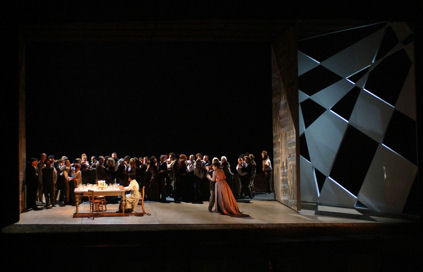

It will be good to hear more from her.” We did on Monday night when she sang the role of Laura. I wrote, “Making an impression in the little role of Zulma, Elvira’s maid, was Rihab Chaieb, a Tunisian-Canadian mezzo. In 2016, I reviewed a performance of L’italiana in Algeri, the Rossini opera, at the Met. The power she sang with made you sit up straighter. (Marfa is a role in Mussorgsky’s Khovanshchina.) Petrova made Federica a battle-ax, a woman to tremble before. She was ultra-Slavic, a Marfa of a Federica. Wurm is the villain of the piece-a real worm-and he was sung, capably, by another Russian bass, Dmitry Belosselskiy.įederica, a dislikable duchess, was a Russian mezzo, Olesya Petrova. The latter was taken by Alexander Vinogradov, a Russian bass. Verdi liked father roles, of course, and there are two of them in Luisa Miller: Miller and Count Walter, Rodolfo’s father (a nasty man). I could not help wondering: What was Beczala thinking, with Plácido Domingo, the legendary tenor, on the stage? For that matter, what was Domingo thinking, as this whippersnapper was singing his role-his old role-beside him? His vocal freedom meant that he could sing with interpretive confidence. He had a good night-a wonderful night-free and accurate. Singing the old Domingo role, Rodolfo, was Piotr Beczala, the Polish tenor. You could fault her for this or that, but she was always operatic.


She has a lot of voice, and it was unforced. Her voice was dark-hued, and she lightened it-both in weight and in color-for coloratura. Singing the title role, Luisa, was Sonya Yoncheva, the Bulgarian soprano. Bertrand de Billy helped me to like it better.ĭomingo and a couple of others aside, the Met’s stage on Monday night was Slavic.

I will tell you something else that’s frank: I have never really liked Luisa Miller. On him, the life of the performance depends. This is judgment.įrankly, the most important person in Luisa Miller is the conductor. And this reminds me: when dealing with arias and such, Maestro de Billy exhibited an unusual and excellent blend of leadership and accompaniment. In the tenor aria, he executed some beautiful phrasing. He conducted Luisa Miller as if it were a masterpiece-as if he were conducting Otello or Die Walküre. And Maestro de Billy continued to conduct very, very well. Sometimes, Luisa Miller resembles a clarinet concerto. He would continue to play outstandingly as the opera unfolded. What a difference this makes, setting a tone for the evening.Īnd this overture featured some skillful and beautiful clarinet playing by the Met’s recently appointed principal, Anton Rist. The overture had crispness, bounce, and verve. This opera, like most, begins with an overture, and the conductor, Bertrand de Billy, conducted it very, very well. For the last many years, Domingo has operated as a baritone, and he was onstage Monday night as Miller, father of the title character. The role is Rodolfo (though not as famous as another Rodolfo, the young man in La bohème). The most famous excerpt from Luisa Miller is the tenor aria, “Quando le sere al placido.” Speaking of that last word: Plácido Domingo was a famous singer of this aria, and this role. The Met’s current production is that of Elijah Moshinsky from 2001. It’s about-what else is new?-love and betrayal. The opera is based on a play by Schiller. On Monday night, the Metropolitan Opera offered Luisa Miller, Verdi’s opera from 1849.


 0 kommentar(er)
0 kommentar(er)
